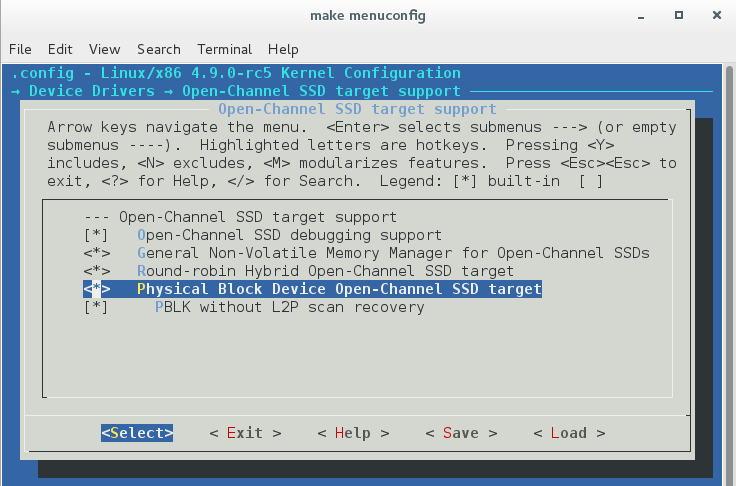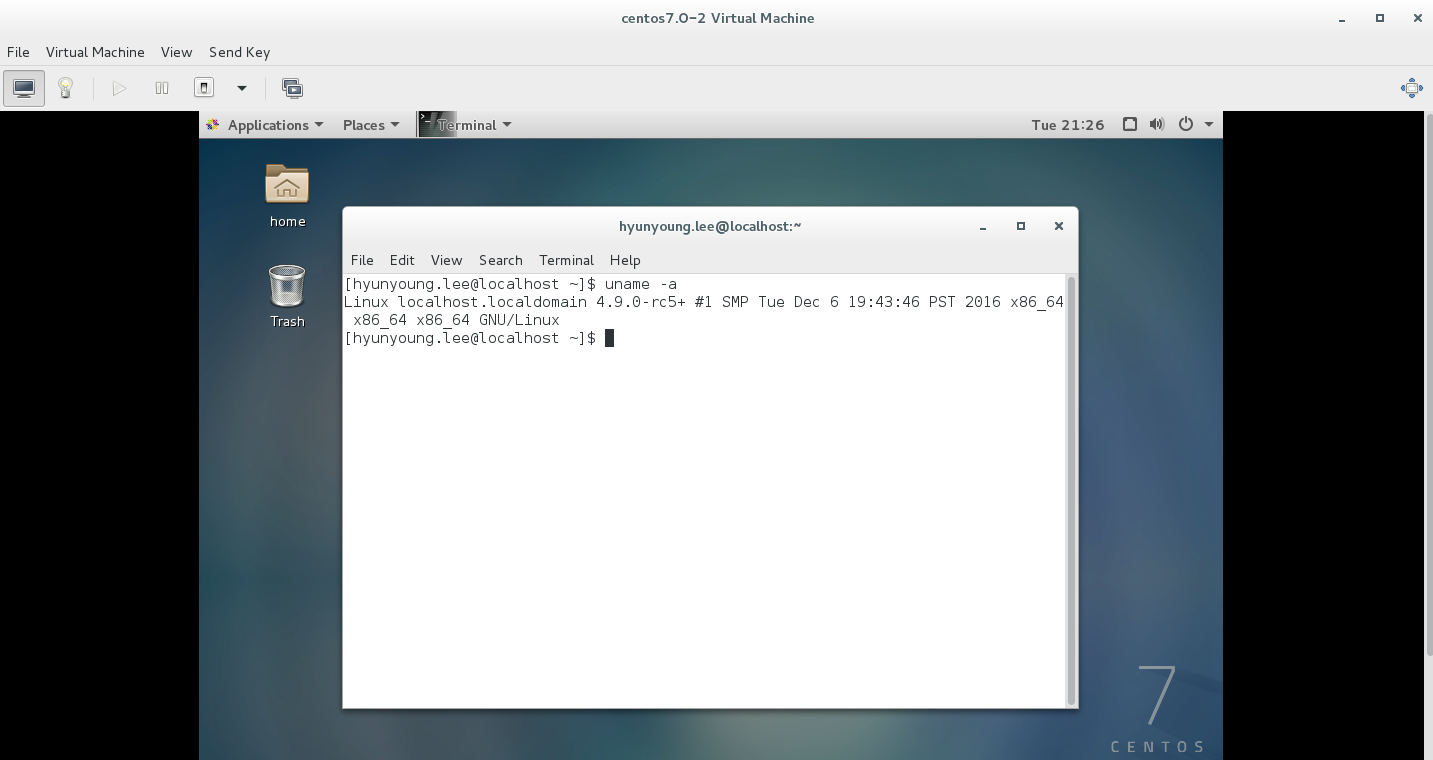Linux Kernel document of kconfig
I will quote the above file for resolving my questaion of kernel build.
Use “make help” to list all of the possible configuration targets.
General
New Kernel release often introduce new config symbols. often more important, new kernel releases may rename configure symbols. when this happen, using a previously working .config file and running “make oldconfig” won’t necessarily produce a working new kernel for you, so you may find that You may find that you need to see what NEW kernel symbols have been introduced.
To see a list of new config symbols when using “make oldconfig”. use
cp user/somewhere/old.config .config
make listnewconfig
and the config program will list any new symbols, one per line.
scripts/diffconfig .config.old .config | less.
After reading the above article, I suppose if I find error, I need to find any new symbol on “make *config” command
my example with openchannelSSD
After reading Stackoverflow about .config.
I have question about “make *config”.
I just wanted to test it, so I will test it as follows.
this test is for verifying my thougt.
my test is implemented on qemu-nvme for OpenChannelSSD with CentOS 7
The following is the same process before procedure below.
as a result, “make oldconfig” is the same from “make olddefconfig”.
BUT when you type “make oldconfig”, if you reply by default against oldconfig.
replying by default is easy, for example
in the case below of [Y/n/?], you just reply “y” to fit upper case.
otherwise, when you don’t reply by default, “make oldconfig” and make olddefconfig could be different.
Use a virtually-mapped stack (VMAP_STACK) [Y/n/?] (NEW) Y
- preparing for kernel compile.
$ su
Password:
# chmod u+w /etc/sudoers
# vim /etc/sudoers
- in /etc/sudoers, I registerd user
# chmod u-w /etc/sudoers
# exit
$ reboot
$ sudo yum groupinstall "Development Tools"
$ sudo yum install -y openssl-devel
$ sudo yum install -y ncurese-devel
$ sudo yum install -y qt-devel
- zsh & theme
$ sudo yum install zsh
$ sh -c "$(curl -fsSL https://raw.github.com/robbyrussell/oh-my-zsh/master/tools/install.sh)"
$ vim ~/.zshrc
- kernel Download
$ git clone https://github.com/OpenChannelSSD/linux.git
$ cd linux
$ cp /usr/src/kernels/3.10.0-327.36.1.el7.x86_64/.config ./.config
- only make menuconfig
# preparing for kernel compile
$ make help
...
Configuration targets:
...
menuconfig - Update current config utilising a menu based program
...
$ make menuconfig
- make oldconfig and make menuconfig
# preparing for kernel compile
$ make help
...
Configuration targets:
...
oldconfig - Update current config utilising a provided .config as base
...
$ make oldconfig
...
for example, queistion of configuration is like first letter.
Use a virtually-mapped stack (VMAP_STACK) [Y/n/?] (NEW) Y
...
$ make menuconfig
- make olddefconfig and make menuconfig.
# preparing for kernel compile
$ make help
...
Configuration targets:
...
olddefconfig - Same as silentoldconfig but sets new symbols to their
default value
...
$ make olddefconfig
...
HOSTCC scripts/basic/fixdep
HOSTCC scripts/kconfig/conf.o
SHIPPED scripts/kconfig/zconf.tab.c
SHIPPED scripts/kconfig/zconf.lex.c
SHIPPED scripts/kconfig/zconf.hash.c
HOSTCC scripts/kconfig/zconf.tab.o
HOSTLD scripts/kconfig/conf
scripts/kconfig/conf --olddefconfig Kconfig
#
# configuration written to .config
#
...
$ make menuconfig
after “make menuconfig”
pblk.20 on OpenchannelSSD
.png)
like officail site’s source install.

-NVM_Express_block_device.png)
$ sudo make modules_install
$ sudo make install
The result of rebooting is as follows.

on the above setting, Another experiment,
on Host OS
-making ramdisk
$ mkdir ./root/ramdisk
$ sudo mount -t tmpfs -o size=2G tempfs ./root/ramdisk
- making virtual disk
$ dd if=/dev/zero of=~/root/ramdisk/blknvm bs=1G count=4
- qemu-nvme install
$ git clone https://github.com/OpenchannelSSD/qemu-nvme.git
$ cd qemu-nvme
$ ./configure --python=/usr/bin/python2 --enable-kvm --target-list=x86_64-softmmu --enable-linux-aio --prefix=$HOME/qemu-nvme
-maybe error happen.
$ sudo yum install -y gtk2-devel
$ sudo yum install libaio-devel
$ make -j8
$ sudo make install
on Geuste OS
-install lnvm
$ git clone https://github.com/OpenChannelSSD/lnvm.git
$ cd lnvm
$ make
$ sudo make install
- install fio
$ git clone http://git.kernel.dk/fio.git
$ cd fio
- zlib-devel or libaio-devel
$ sudo yum install zlib-devel or $ sudo yum install libaio-devel
$ ./configure
$ make
$ sudo make install
$ fio -version
- shell script of fio
# !/bin/zsh
BS=4k(lower case)
RW=randwrite
for RDN in $(seq 0 9)
do
fio --name=$BS-$RW-$RDN \
--filename=/dev/hyun \
--rw=$RW \
--bs=$BS \
--ioengine=libaio \
--numjobs=1 \
--iodepth=256 \
--direct=1 \
--thread \
--write_iops_log=$BS-$RW-$RDN \
--log_avg_msec=1000 \
done
Reference
Linux kernel Document’s Kconfig
Stackover flow’s make oldfonfig